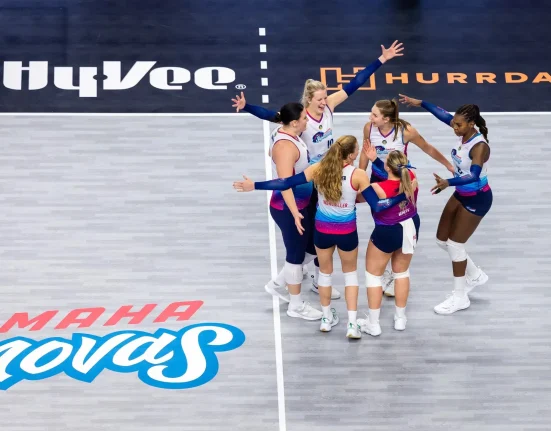Desaparecidos Drop Politically Charged New Album
By Kyle Eustice
Mention the name Conor Oberst and thousands of teenage girls (and probably boys) heave a collective sigh of admiration. The Omaha indie rock musician has been making people weep since the early ‘90s when he emerged as just a shy, teenage kid with a guitar and clever, evocative lyrics. However, there’s a rawer side behind Oberst’s big brown eyes and brutally honest, emotional songs.
Oberst came up during the Cog Factory days, which was a gritty, downtown Omaha venue famous for its wild shows featuring future members of The Faint, Cursive and other notable Omaha bands. It seems he has found another emotional (and much louder) outlet with the Despareacidos (sometimes referred to as Desa), his more punk-inspired rock band. Along with guitarist Denver Dalley, cousin/keyboardist Ian McElroy, bassist Landon Hedges and drummer Matt Baum, Oberst has opened up a whole new chapter in his musical story. Payola, the group’s second album since 2002’s Read Music/Speak Spanish, was just released by Epitaph, a huge milestone for the seasoned musicians. The elephant in the room is the 10 years that flew by in between records, but there’s an easy explanation for that. They were busy.
“It all came down to timing,” Dalley says. “We didn’t think the timing was right before, but it was right now. Every band likes to be defiant and do things on their own terms. I feel like Desaparecidos is an extreme case and will do what we want, whenever we want [laughs]. Before, it felt kind of forced and didn’t really feel as genuine. Time went by and then we played a reunion show and had this great chemistry. It felt fun again, which I think is what ultimately made it happen now. Our schedules aligned and we are all just having such a good time with it. That is always the most important thing.”
With Oberst on tour in support of his 2014 solo record, Upside Down Mountain, Hedges focused on his band Little Brazil and the rest of Desa consumed with their other projects, it wasn’t exactly simple to make it work.
“There’s times when it’s a little hectic,” he explains.” In the other projects, each member is in charge, not always, but like Conor with Bright Eyes and Landon with Little Brazil; we can kind of put those on the back burner because we already know how hard it is to align these five schedules. We were able to put all the other projects on hold and work around this. It was hard to get the stars to align.”
In a way, the stars have been aligning since the five members were just young kids. Dalley met Oberst in 4th grade and then met Hedges in 7th grade. They’ve lived within a couple of miles each other nearly their entire lives.
“Conor and I had a lot of common friends,” he says. “We met at the Emmy Gifford Children’s Theatre [Omaha]. Years later, Matt, Ian and I started the band then Conor joined, then Ian.”
As they traveled along their individual paths, Oberst, of course, catapulted to notoriety. In fact, Rolling Stone once called him “the Bob Dylan of our generation.” To this day, Oberst’s “celebrity” status is blatantly obvious, especially to the other members of Desa.
“There have been certain things that have been extreme,” Dalley recalls. “It’s an interesting thing because a lot of people feel very close to Conor because his lyrics have gotten them through hard times. In their minds, they think there’s this intimacy, but in reality, they’re complete strangers. The most recent thing that comes to mind is we went to this bar next door after playing a show in Los Angeles. Someone was harassing him and he wouldn’t take no for an answer in regard to a picture. At one point, they jumped across the table so their friend could take a picture.
“Don’t get me wrong,” he continues. “He always stops and takes pictures. It’s not like a bother, but this person was just so aggressive. They kept coming back. It was getting really strange to the point where Ian had to say to give him some space. Conor is a kind and patient person unless someone really crosses the line. That’s just who he is. He appreciates his position in life, too.”
At the same time, Dalley remembers playing in Washington D.C. and Ian MacKaye [Fugazi, Minor Threat] came out to see the show.
“We were so nervous, even Conor,” he says. “We didn’t know what to say so we kept introducing him to everyone. We did that like five times. But at the end of the day, yeah, everyone is just a person.”
However, it doesn’t hurt to have people like Bad Religion’s Brett Gurewitz backing you. His label, Epitaph Records, has been home to many incredible artists, including ALL, Agnostic Front, Descendents, Dwarves, Sage Francis, The Cramps, and Thelonious Monk. It wasn’t a place they thought they would end up.
“It’s funny,” he says. “We joked about that like, ‘Maybe somebody like Epitaph would be interested’ and it came true. We’re all very excited because we’ve always looked up to the label. Everyone has been awesome and nice.”
“I was excited to see what they had to say in our meeting,” Hedges adds. “I was even more excited when we left the meeting. They are very cool people.”
Payola is the result of many years of writing. It wouldn’t have happened without the aforementioned reunion show. In 2010, Desa played at the Concert for Equality in Omaha [an event organized by Oberst to promote the repeal of then-recently enacted measures to prohibit businesses and landlords from hiring or renting to undocumented immigrants in Fremont, Nebraska]. The band embarked on a short summer tour in 2012 and self-released several tracks. Six tracks featured on Payola were written during that time, including “MariKKKopa,” “Backsell,” “Anonymous,” “The Left is Right,” “Te Amo Camila Vallejo,” and “The Underground Man.” Sonically, Payola is like a 39-minute punch in the face.
“There’s no break,” Dalley says. “There’s no ballad type song. On the first album, it was quieter at first, but this one is unrelenting. From a writing perspective, it’s always been a collaborative process, but I feel like it was even more so this time around. Recording wise, we picked at it when we could. We spread it out over a few years when we had time to record and had the material, really. It happened pretty organically.”
For Bright Eyes fans, this album may come as a shock. It’s a completely different side of Oberst not everyone has been exposed to before, but it’s always been bubbling underneath the surface
“He’s always had this side to him,” Dalley says. “Going back to the Cog Factory, there were bands like Commander Venus [which eventually became The Faint]. I think it’s cool to see a different side to him because it’s always been there. We all grew up idolizing Slowdown Virginia and later Cursive so I think that’s in all of us. I always hear people say overwhelmingly, at least to me anyway, that they prefer Desa over Bright Eyes just because it’s another side of him.”
Throughout the new album, there are a lot of different messages, mostly of a political nature. If you’re looking for lyrics to help you through a recent heartache, this album isn’t it. They have much more important issues on the table these days.
“All the lyrics aren’t about your boyfriend, your girlfriend or the break up,” Dalley says. “They’re about actual social issues that are going on around them and hopefully the songs will inspire them to look them up. We want you to learn more about something and not let these bubble gum lyrics go in one ear and out the other. There’s a time and a place for those songs, too, but I think there’s been a lack of songs that are more socially aware that get can stuck in your head, but make you want to look more into the lyrics.”
For now, the future looks bright for the Desaparecidos. They are going on an extensive tour in support of Payola and will likely gain countless new supporters along the way.
“I think we’re just going to take it one day at a time,” Dalley says. “We’ve had discussions in the band like ‘Do you want to see your CD on the counter at Starbucks?’ Not that that’s on the horizon, but we are just throwing things out there. Especially with this band, given the content, the most important thing is to get the message out there. The idea that one song you do could inspire someone to look something up and get involved in an issue or start a protest, or whatever, is huge. As long as we’re spreading the word about what we are passionate about and believe in, and having fun, that’s really all that I could hope for.”
“It’s very exciting to have gone through the whole process with these guys again,” Hedges adds. “Our focus is to have fun playing music together.”
Some people might not like Bright Eyes, but will love Desa. Some people might love Bright Eyes and not like Desa. Either way, the guys are just happy to be able to do this for a living and really aren’t concerned with a popularity contest.
“The idea of being able to play music for a living, to me, it’s unreal,” Dalley says. “It gets crazy if you find yourself on late night television, but part of me always thought I end up painting houses for a living. We’re doing it for a living, but I wouldn’t say we are a rich band. We can pay our bills for the most part [laughs].”
(Originally interviewed for Ghettoblaster Magazine.)
Desaparecidos, September 10, at The Waiting Room, 6212 Maple St., 9 p.m. Tickets are $20. Visit www.onepercentproductions.com for more information.







Leave feedback about this